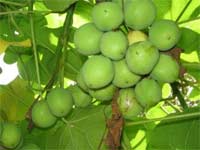A company called My Dream Fuel LLC is cultivating the Jatropha curcas in LaBelle in Southwest Florida. Jatropha is a tree-shrub that shows promise as a new biodiesel crop in the U.S. that could one day power engines and generators.
Nearly 1 million seedlings are in the ground at a nursery in Hendry County and promoters are looking for farmers – here and across the country – to raise them as oil-producing plants.
Researchers say the plant can produce four times more fuel per acre than soy, and 10 times more than corn.
The demand for oil from the plant already is strong, said Paul Dalton, a former child advocate and attorney who owns My Dream Fuel.
“There are about 100 buyers for every gallon you produce,” he said.
His company soon will open a $1.5 million, 15,000-square-foot center for seed crushing and plant cloning at the State Farmers’ Market off Edison Avenue in Fort Myers.
The Jatropha tree, native to Mexico and Latin America, has been grown in other countries, such as India and Africa, for fuel and medicine. It produces fruit with oily seeds that can be crushed to make biodiesel.
In India, there are large plantations with millions of Jatropha trees and My Dream Fuel has a contract with the government to train 1,500 farmers to grow the trees. In China, there are now more than 1 million acres of Jatropha growing.
Locally, Dalton has so much faith in the trees that he expects to put another 1 million in the ground in LaBelle before June.
His company is one of the first to do large plantings of trees in the U.S., he said.
Some of the trees came from a cloning plant in Mysore, India, and some came from the company’s own testing program.
The cloning plant here will be able to churn out plants at the rate of 1 million a month, Dalton said.
“We studied our mother trees that we use to clone for over six years, and we have over 500 of them. So we have the largest bank of mother trees in the world, of any company,” he said.
Dalton expects his seedlings to go quickly. Last year, his company sold its entire inventory of about 12,000 trees in four days, he said. Back then, the trees were in pots and there wasn’t a nursery.
“We know of a couple of groups from New York and from Spain that want to plant in Texas and Brazil. So in the next couple of weeks, we may exhaust our current supply,” Dalton said.
In Southwest Florida, Dalton is targeting citrus growers with diseased trees and cattle ranchers looking to
A few other growers are trying Jatropha in Southwest Florida, but they’re keeping it quiet, in part because they want to stay ahead of the competition, he said.
Ron Hamel, executive vice president of the Gulf Citrus Growers Association, representing growers in a five-county region, said he hasn’t heard that growers are jumping all over the idea.
But the potential for a new crop has created a buzz in the industry.
“I haven’t heard anything negative about it,” Hamel said.
Locally, environmentalists don’t seem to be raising a big fuss about Jatropha.
“If it lives up to its promise of being a very productive source for biofuel, then great,” said Brad Cornell, a policy advocate for Audubon of Florida and the Collier County Audubon Society.
The society doesn’t support growing corn for ethanol because there’s no efficient way to do it, and there are concerns about greenhouse gas emissions, he said.
Roy Beckford, an agricultural and natural resource agent for the University of Florida/IFAS in Lee County, has pushed Jatropha as an alternative crop for South Florida growers for years.
He said it’s actually good for the environment because one acre of plantings, which is about 600 trees, will remove four metric tons of carbon dioxide gas from the air a year.
Beckford is overseeing several experiments with Jatropha in Lee County. He’s also working with a few farmers with plans to grow the trees commercially on 10-acre plots in North Fort Myers and Arcadia.
One grower in Lee County has set aside 200 acres for the promising crop, Beckford said.
“Certainly in our area we are kind of pioneering this whole thing,” he said.

